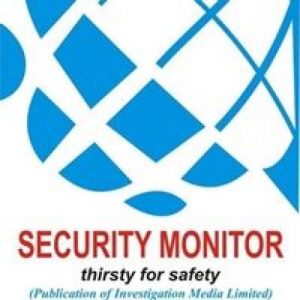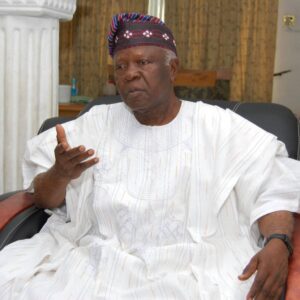The Giant Stride of NCAM Towards Food Security in Nigeria
Sitting on an over a thousand hectares of land on the outskirts of the rustic town of Idofian, Kwara state, the National Centre for Agricultural Mechanization (NCAM) is unarguably a hub for agricultural mechanization and it is the only one of its kind in Nigeria and Africa South of the Sahara. SECURITY MONITOR’s Rowland ‘Shuwa recently took a tour of the facilities and spoke with the Executive Director of the Centre, Mr. Yomi Kasali and files in this report.
There is no doubt that Nigeria is a country blessed with much fertile land and other agricultural resources. The soil is rich, the temperature is warm and favours agricultural production the annual rainfall is well distributed and extreme natural disasters posing any threats to lands, crops and other sources of agricultural production are scarce.
According to research an approximate measurement of the country’s fertile land sums up to over 80 million hectares. No wonder then that Agriculture has been the major source of livelihood to inhabitants of the country for centuries. However, this was done with tedious manual farming techniques which could only produce food for the family and for sustenance.
After independence in 1960, the leaders of the country decided to further develop the sector and ensure the country achieved its plan of a shift from manual labour to the mechanical technique of agriculture with the provision of mechanical equipments to farmers and also ensuring that they were put through the operation of the equipments. This move greatly helped the development of agriculture and it contributed about 65% to the GDP which was a typical stat for agrarian nations, especially developing ones. However, after the oil boom, the percentage took a precarious nose dive to a creepy 25%.
But nothing lasts forever and so with the current down turn in the oil sector and the current concerns in the Niger Delta region for resource control, government on all levels have found a safe haven in the ancient occupation and have gradually drifted back to ensuring that full and total mechanization of the agricultural sector is achieved.
The National Centre for Agricultural Mechanization (NCAM) is one of such centres. According to the Executive Director of the centre, Mr. Yomi Kasali, “it was established in response to the need for Nigeria to attain self-sufficiency in food and fibre production. Government was convinced of the indispensible role of agricultural mechanization in this sublime goal of attainment of food self-sufficiency.
“NCAM was established in 1990 with a decree 35 which is an act of the National Assembly. We are mandated to research and innovate into indigenous technology that can aid the agricultural production in the country and also to test and validate agricultural equipment, both imported and those indigenously produced so that we can validate them and try to adapt them to the country, most especially the imported ones.
“We also provide training and technical back-stooping in agricultural mechanization to critical stakeholders including farmers, equipment fabrication, processors and end-users in livestock and crop value chains. And we promote co-operation and collaboration with similar internal and external institutions aimed at enhancing agricultural mechanization.”
Presently, in order for the centre to actively discharge its duties it is composed of eight departments which subsume several distinct units and sections. There are six technical departments, namely: Farm Power and Machinery (FPM); Processing and Storage Engineering (PSE); Land and water management engineering (LWE); engineering and scientific services (ESS); Agro-Industries Development and Extension (AIDE) and Planning, Monitoring and Evaluation (PME). Other departments providing support services in the centre include, Human Resources Development (HRD) and Finance and Accounts (F&A).
It will not be ludicrous to say that the daunting task of ensuring total mechanization of the agricultural sector in the country rests squarely on the shoulders of NCAM but how far have they gone in achieving this herculean task?
According to Mr. Kasali, “We have tried our best with the resources within our reach to make ensure drudgery is eradicated from our land. You see, the importance of agricultural mechanization can never be over emphasized. It helps to reduce drudgery and increases agricultural productivity; it enhances farmers’ efficiency and also ensures food security which is our ultimate goal.
“You will agree with me that the present state of agricultural mechanization in Nigeria and Africa as a whole calls for urgent intervention by all concerned including the international agencies, governmental and non-governmental organizations (NGOs). This is because agriculture in these parts is generally characterized by very low efficiency and outputs; tractor density is very low and most of the the operations in the livestock and crop value chains are carried out using traditional tools and methods. Also availability and accessibility of appropriate technologies constitute very serious challenge in farm production and processing of produce
“Despite these daunting challenges, NCAM have over the years recorded modest achievements in its contributions towards realizing its mandate. We have developed several agricultural technologies too numerous to mention including a mini tractor which is the first made in Nigeria tractor. We have also developed several standards and test codes for agricultural equipments in collaboration with the Standards Organization of Nigeria (SON).
“We have conducted several trainings both local and international on fabrication, farm techniques, food processing and other value added programmes for youths, women, farmers, fabricators and many other stakeholders in agricultural sector. We have also extended many of our appropriate agricultural mechanization to the farmers in collaboration with the agricultural development projects (ADPs) of the various states. We have participated and won various prizes in various exhibitions and trade fairs and have also conducted test and certification for several agricultural machines and equipment.”
Clarifying on the need for test and certification of imported machineries, the NCAM boss explained that Nigeria is a very vast country with different ecological zones and peculiarity in terms of agric production. He stated that this is why fabricated machines from the centre take cognizance of the grassroots as the centre adapts the local technology and use it for the good of the people.
Speaking on the current campaign for diversification of the economy and the centre’s contribution towards ensuring its success, Mr. Kasali agreed that government is right to diversify the economy. He disclosed that diversification of the economy is part of the present administration’s laudable effort to bring back the glory days of the groundnut pyramid in the north, lush and rich cocoa in the south and glitteringly red palm oil in the east. He stated that, apart from the dignity of labour they represent, all these contributed immensely to the country’s GDP as they were the mainstay of the economy back then.
He pointed out that although there are some areas like the solid minerals which could also boost the country’s GDP but agriculture is the major employer of people as it can generate up to 70% of the labour requirement in the country.
Speaking on the federal government’s resolve to ensure that the country no longer imports rice, the NCAM boss said, “In the 2017 budget, we have a budget that will cover about 18 states, including Kwara State. We give priorities to those that are producing rice. And we want to let you know that in 2016 budget, we created 11 processing sheds in Kwara state alone. We have six in Patigi zone where they cultivate rice. And we have five in cassava producing areas like Osi, Ganmo, Idofian. All our equipments are being mobilized to equip them ahead of production. And because of the cost of the equipments, we are getting subsidy from government this time around. The money they make there, they use it to maintain the equipment.”
He also disclosed that the centre has already embarked on a program called SAWAH. He said, “SAWAH is an eco-technology which improves rice ecology from current poor water control to good water control by farmers self-support efforts without heavily dependent on contractor based irrigation development. It is a technology that conserves water, good management of water, and also the technology that allows the yield of rice to grow tremendously.
“The term SAWAH refers to leveled rice field surrounded by bunds with inlet and outlet connecting irrigation and drainage canals. The term originates from Malayo-Indonesian. The English term ‘paddy’ or ‘padi’ also originates from Malayo –Indonesian. The project was brought to NCAM in 2009 during the immediate past administration when the centre entered into collaboration with the Laboratory of Ecological Engineering, Faculty of Agriculture, Kinki University, Japan which was headed by Prof. Toshiyuki Wakatsuki.”
Mr. Kasali stated further that the NCAM-SAWAH project is led by Engr. (Dr.) Y.S. Ademiluyi as the National coordinator who has been at the helm of affairs of the dissemination of the eco-technology in line with the mandate of the centre on ‘disseminating information on methods and programs for achieving speedy agricultural mechanization.’
In order to ensure the speedy realization of the SAWAH project, the NACAM boss disclosed that the centre has entered into collaboration with various organizations such as the Third National Fadama Development Project, (NFDP) using the already existing national network coverage of Fadama III project as a platform to extend this technology.
He stated that the centre has also collaborated with the Commercial Agricultural Development Project, (CADP), the United Nations Millennium Development Villages, (UN-MDV), United Nations Univeristy, Nagoya University, and the United Nations University- Institute for Sustainability and Peace (UNU-ISP), United Nations University –Institute for Advance Studies and Sustainability (UNU-IAS) and Kinki/Shimane University, all in Japan as well as the Japan International Cooperation Agency (JICA) on technical ground.
On the achievements of the project so far, Mr. Kasali disclosed that pilot states from the six geo-political zones has been selected namely; Benue, Borno, Delta, Ebonyi, Kebbi and Lagos while demonstrations sites in the selected states in the six geo-political zones have been done through what is called ‘site selection’ and Sawah system design’. “This was carried out in two phases. Phase one comprised of Benue, Borno and Kebbi states and was done between August 22 and August 31, 2010. Phase two comprised of Lagos, Delta and Ebonyi states and were done in October 2010,” he supplied.
According to him, a workshop and train-the-trainers conference was organized for Fadama III facilitators from the selected states by NCAM and took place between October 24th and 30th, 2010. In 2011, development of the demonstration sites in the selected states was carried out with results. That same year also an international conference on Sawah Eco-technology and rice farming in sub-Saharan Africa was organized and attended by Fadama III officers. The centre also organized field days in the selected states to sensitize other farmers and farmer groups.
He stated that, “In the bid to ensure that we achieve food security especially in the area of rice production, our achievement is hinged on rekindling the spirit of rice farmers in the profitability of rice farming in the country. When farmers become aware of how profitable it is to cultivate rice and the production process is made much comfortable and attractive to them we would have achieved much.
“For example, in 2010 Kinki/Shimane University, NCAM and Fadama III collaborate and brought SAWAH technology into Kebbi and other states. Two years after due to the hardworking and commitment of farmers and the good support of te state government a rice revolution happened in Kebbi state. The farmers produced paddy rice close to one million metric tonnes in year 2015.
In Kebbi State before 2011, they were producing rice and the yield was between 2.5 tonnes per hectre to three tones per hectre. But now, Kebbi is producing seven tones per hectre and we should also commend the government of Kebbi State for encouraging the farmers.
“We have also continued to build on that achievement by increasing average paddy yield threshold of rice farmers in participating localities. For example in Ebonyi state rice yield ranges from 6.5 t/ha and 7.2 t/ha and in Kebbi state rice yield ranges from 6.5 t/ha and 7.2 t.ha. We are also partnering with the Commercial Agricultural Development Association (CADA) for improvement in the rice value chain.”
According to the NCAM boss, thirteen states of the federation are presently involved in the SAWAH eco-technology project. These include; Kebbi, Kaduna, Benue, Cross Rver, Niger, Nasarawa, Lagos, Osun, Ebonyi, Delta, Kwara, Ekiti and Ondo states.
However, there have been some hiccups confronting the project in the country which the executive director numerated as wide variation in weather and environment conditions which has resulted in short rainfall, delayed onset of rain, flooding, bird and insect attack in some of the Sawah sites. Also he listed land tenure problem, security challenges facing the north-eastern zone of the country, low awareness of farmers on mechanization options for lowland utilization and also lack of fund to encourage more sites to participate.
Indeed, the National Centre for Agricultural Mechanization (NCAM), Idofian, has lived up to its mandate and in the words of the executive director, “NCAM has produced many simple tools and equipment to help local farmers produce more. The centre also trains local farmers on how to use the tools and equipment.
“For an example, there is drudgery in the cultivation of cassava. NCAM has therefore stepped into the sector, we replicated the Brazilian Cassava planter; a two row cassava planter and we were able to achieve 90% efficiency. Our cassava planter is even better than the imported one from Brazil because we made sure we reduced the weight and efficiency increased.
“We have produced rice equipments like threshers, hand held reaper, which even a low level farmer can use. We are now producing what we call rice transplanter. Rice planting is very tedious, and because of these, we want to produce a transplanter that can transplant rice. That is one of the areas in the country that people have not entered into because of the complexity of the machine. We want to solve that problem.
“We have produced arrays of equipment in rice production, in cassava production, and in harvesting cassava. We have fabricated cassava frying machine that can fry the mash. We fabricated a cassava peeler that can peel cassava. We also have oil palm processing line. We produce oil in high quality.”
On the cost of these equipments and how local farmers can acquire them, The NCAM boss agreed that most are out of the range of ordinary local farmers. He said some are expensive while others are not. He said although the centre has tried in scaling them down yet the purchasing power of our farmers is too low.
He attributed this to the fact that most farmers are small holdings and their farms are in subsistence level. He therefore urged farmers to form cooperative groups. According to him, forming cooperative groups mean that farmers can source for money so that all the risks involved in the farming will be spread on members, which will reduce the level of risk.
Our reporter was conducted round to see staff of the centre in the process of fabricating agricultural tools and equipment. It was an impressive sight seeing men and women toiling happily to fabricate agricultural tools and equipment. Indeed, with adequate collaboration from relevant stakeholders and government agencies there is no doubt that with time the full mechanization of our agricultural sector will see the light of day.







